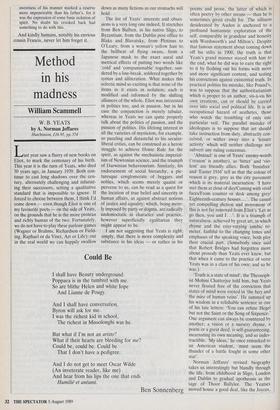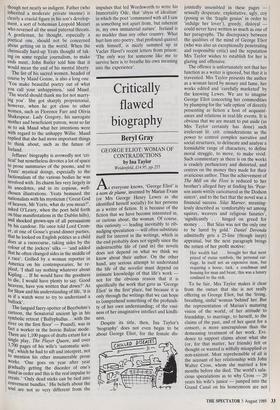Method in his madness
William Scammell
W. B. YEATS by A. Norman Jeffares
Hutchinson, £16.95, pp.3 74
Last year saw a flurry of new books on Eliot, to mark the centenary of his birth. This year it is the turn of Yeats, who died 50 years ago, in January 1939. Both con- tinue to cast long shadows over the cen- tury, alternately challenging and infuriat- ing their successors, setting a qualitative standard that is impossible to ignore. If forced to choose between them, I think I'd come down — even though Eliot is one of my favourite poets — on the side of Yeats, on the grounds that he is the more protean and richly human of the two. Fortunately, we do not have to play these parlour-games (Wagner or Brahms, Richardson or Field- ing, Raphael or da Vinci, Art or Life); out in the real world we can happily swallow
down as many fictions as our stomachs will hold.
The list of Yeats' interests and obses- sions is a very long one indeed. It stretches from Ben Bulben, in his native Sligo, to Byzantium, from the Dublin post office to Blake and Blavatsky, from Plotinus to O'Leary, from a woman's yellow hair to. the bellbeat of flying swans, from a Japanese mask to the exact aural and metrical effects of putting two words like `cold' and `companionable' together, sun- dered by a line-break, soldered together by syntax and alliteration. What makes this eclectic mind so exciting is that none of the items in it exists in isolation; each is modified and informed by the shifting alliances of the whole. Eliot was interested in politics too, and in passion, but in his case the conjunction is merely tabular, whereas in Yeats we can quite properly talk about the politics of passion, and the passion of politics. His lifelong interest in all the varieties of mysticism, for example, so puzzling and distasteful to his secular- liberal critics, can be construed as a heroic struggle to achieve Home Rule for the spirit, as against the mechanistic imperial- ism of Newtonian science, and the triumph of Darwinian behaviourism. Similarly, his endorsement of social hierarchy, a pic- turesque conglomerate of beggars and nobles, which seems merely quaint or perverse to us, can be read as a quest for the location of true belief and sincerity in human affairs, as against abstract notions of justice and equality; which, being mere- ly imposed by party or dogma, are radically undemocratic in character and practice, however superficially egalitarian they might appear to be.
I am not suggesting that Yeats is right; simply, that there is more complexity and substance in his ideas — or rather in his
poems and prose, the latter of which is often poetry by other means — than he is sometimes given credit for. The silliness desiderated by Auden is anchored to a profound humanistic exploration of the self, comparable in grandeur and honesty with Wordsworth's and Milton's. Despite that famous statement about coming down off his stilts in 1900, the truth is that Yeats's grand manner stayed with him to the end; what he did was to earn the right to it by fleshing out his forms with more and more significant content, and testing his convictions against existential truth. In practical politics his mistake, like Pound's, was to suppose that the authoritarianism which is proper to an author, vis-à-vis his own creations, can or should be carried over into social and political life. It is an occupational hazard of aesthetes, those who watch the trembling of only one particular veil. The parallel mistake of ideologues is to suppose that art should take instruction from duty, abstractly con- ceived, or wither away into a 'leisure activity' which will neither challenge nor subvert any ruling concensus.
`Abstract' is one of Yeats' enemy-words (`reason' is another), as 'bitter' and 'vio- lent' are friendly allies. Both Innisfree' and 'Easter 1916' tell us that the colour of reason is grey, grey as the city pavement which is its material incarnation. `I have met them at close of day/Coming with vivid faces/From counter or desk among grey/ Eighteenth-century houses...'. The casual yet compelling diction and movement of this is not far removed from Eliot's `Let us go then, you and I...'. It is a triumph of naturalness, achieved by great art, in which rhyme and the ever-varying iambic tri- meter, faithful to the changing tones and emphases of the speaking voice, both play their crucial part. (Somebody once said that Robert Bridges had forgotten more about prosody than Yeats ever knew, but that when it came to the practice of verse Yeats was in a class of his own; and so he was.) `Truth is a state of mind', the Theosoph- ist Mohini Chatterjee told him, but Yeats never floated free of the conviction that states of mind were rooted in `the fury and the mire of human veins'. He summed up his wisdom in a relishable sentence in one of his late letters: 'You can refute Hegel but not the Saint or the Song of Sixpence.' One argument can always be countered by another; a vision or a nursery rhyme, a poem or a great deed, is self-guaranteeing, incarnating its own meaning, and so indes- tructible. 'My ideas,' he once remarked to an American student, `must seem the thunder of a battle fought in some other star'.
Norman Jeffares' revised biography takes us interestingly but blandly through the life, from childhood in Sligo, London and Dublin to gradual apotheosis as the sage of Thoor Ballylee. The Yeatses moved house a good deal, like the Joyces. though not nearly so indigent. Father (who Inherited a moderate private income) is clearly a crucial figure in his son's develop- ment, a sort of bohemian Leopold Mozart who reversed all the usual paternal threats. A gentleman, he thought, especially a poetical one, should not be concerned about getting on in the world. When the chronically hard-up Yeats thought of tak- ing on some regular journalism, to make ends meet, John Butler told him that it would mean the end of his mental liberty.
The list of his sacred women, headed of course by Maud Gonne, is also a long one. You make beautiful poetry out of what You call your unhappiness,' said Maud. The world should thank me for not marry- ing you'. She got sharply proprietorial, however, when he got close to other women, such as Florence Farr and Olivia Shakespear. Lady Gregory, his surrogate mother and beneficient patron, went so far as to ask Maud what her intentions were with regard to the unhappy Willie. Maud replied that she had more important things to think about, such as the future of Ireland.
Jeffares' biography is avowedly not 'cri- tical' but nonetheless devotes a lot of space to prose summaries of the poems, and to Yeats' mystical doings, especially to the factionalism of the various bodies he was Involved with. Its charm lies very largely in Its anecdotes, and in its copious, well- chosen illustrations. Yeats bemused the nationalists with his mysticism (`Great God of heaven, Mr Yeets, what do you mean?', asked O'Leary, when the poet held forth on blue manifestations in the Dublin hills), and shocked grown-ups of all persuasions by his candour. He once told Lord Crom- er, at one of Gosse's grand dinner parties, that he looked on English politics as a child does at a racecourse, taking sides by the colour of the jockeys' silks — `and added that he often changed sides in the middle of a race'. Grilled by a woman reporter in America on his contemporaries, he re- plied, 'I shall say nothing whatever about
If he would have the goodness to die, I would have plenty to say. Good heavens, have you written that down?' As for Shaw and his understanding of life, 'it is as if a watch were to try to understand a bullock'.
The languid faery-spotter of Becrbohm's cartoon, the Senatorial ancient p in his symbolic retreat (`Ballyphallus ... with the river on the first floor' — Pound), was in fact a worker in the heroic Balzac mode. There are 1,100 pages of drafts extant for a single play, The Player Queen, and over 3,700 pages of his wife's 'automatic writ- ing', which he had to sift and interpret, not to mention his other innumerable prose works. 'One goes on year after year gradually getting the disorder of one's mind in order and this is the real impulse to create.' Only dead sticks can be tied into convenient bundles.' His beliefs about the soul are not so very different from the
impulses that led Wordsworth to write his Immortality Ode, that 'abyss of idealism' in which the poet 'communed with all I saw as something not apart from, but inherent in, my own immaterial nature'. Ireland is no madder than any other country. What hurt him into poetry, that profound quarrel with himself, is nicely summed up in Vaclav Havel's recent letters from prison: The only way for someone like me to survive here is to breathe his own meaning into the experience'.



















































 Previous page
Previous page